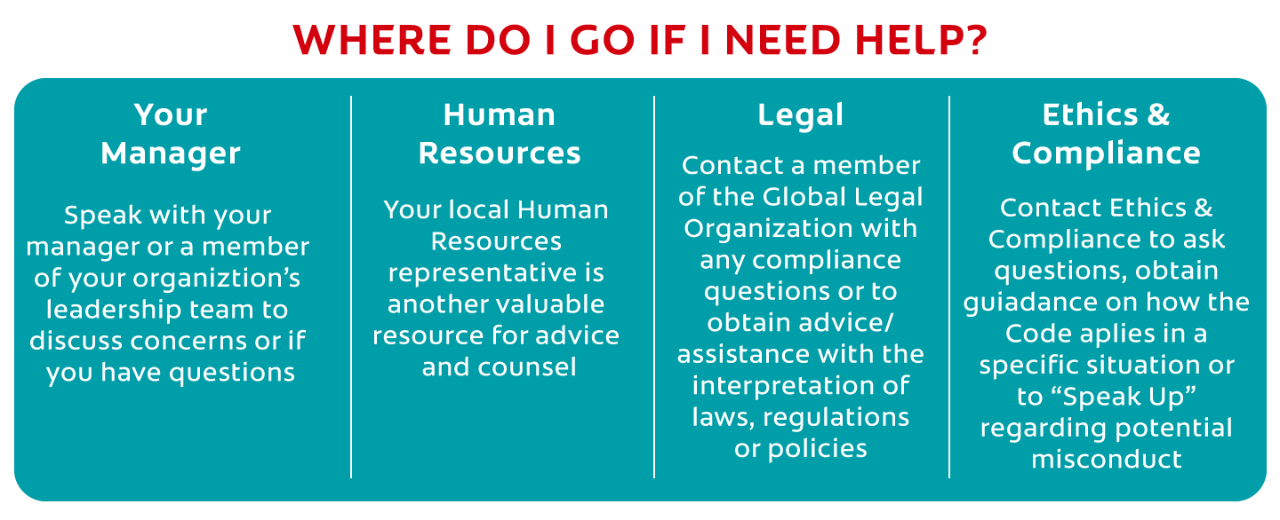Our Relationships
Our interactions with each other should reflect our fundamental values and be based on caring, mutual trust and respect.
Colgate people can obtain additional information by referring to the Company’s Equal Employment Opportunity and Anti-Harassment Policy
Colgate-Palmolive Company prohibits discrimination against any employee or applicant for employment based on:
- Race or Ethnicity
- Color
- Religion
- Gender or Gender Identity
- National Origin
- Citizenship
- Age
- Pregnancy
- Sexual Orientation
- Disability
- Veteran Status
- Marital or Familial Status
- Status as a Victim of Domestic Violence
- Any other characteristic protected by law
This includes, but is not limited to, recruitment, hiring, promotion, transfer, compensation, training, demotion or layoff.
The value of inclusion is reflected in our Company’s culture, practices and respect in the workplace policies. We maintain an inclusive work environment and achieve excellence by attracting and retaining people of all backgrounds in our workforce. Our Company values diversity and we are committed to a workplace where employees are treated fairly and equally by both management and coworkers and are encouraged to express their ideas and opinions. We expect all of our employees to maintain our commitment to a culture where respectful behavior is the norm. Learn more about our diversity initiatives by referring to the Company’s Report on Diversity, Equity and Inclusion.
- We prohibit sexual or any other kind of harassment of Colgate people or third parties doing business with Colgate by any person in the workplace, or while conducting Company business, in compliance with applicable law.
- We prohibit favoritism or the appearance of favoritism in the workplace in accordance with the Company’s policies and procedures.
- We do not use child labor. Child labor is defined as employing any person younger than the minimum age allowed by law in the jurisdiction in question. However, in no event will we knowingly employ anyone younger than sixteen (16) years of age.
- We strive to eliminate potential hazards from the workplace and to comply with all applicable occupational safety and health laws and standards.
- We prohibit the possession, use, sale or transfer of illegal drugs or drug paraphernalia and the misuse of prescription medication on Company property (including vehicles) or time;
- We prohibit the conduct of Company business while under the influence of alcohol or other drugs.
- We require that any instance of drug or alcohol abuse in the workplace, violence or unlawful weapons possession on Company property or time be reported to Human Resources, Global Security, the Global Legal Organization, Global Ethics & Compliance or management immediately.
- We prohibit the possession or use of weapons/firearms, explosive devices or ammunition on Company premises or while conducting Colgate business, subject to local law. Possession of a weapon can be authorized for security personnel when such possession is determined as necessary to secure the safety and security of Colgate and people.
- We prohibit any acts that could be perceived as violent, threatening, degrading, intimidating or could cause another individual to feel unsafe.
If you have concerns about threats or acts of violence that impact the workplace, immediately contact Global Security at +1 212-310-3333.
We grow stronger by acting with integrity and honesty in all situations in which we are engaged on behalf of the Company.
We avoid conflicts of interest
Your judgment is one of your most valuable assets. You should avoid any activity or association that conflicts with or appears to compromise your objectivity or use of independent judgment in conducting business for or with the Company. Conflicts can arise in many situations. It is impossible to cover them all here, and it will not always be easy to distinguish between proper and improper activity. When in doubt, consult your Manager, Human Resources, the Global Legal Organization or Global Ethics & Compliance before taking any action.
What are some examples of proprietary information?
While not complete, this list provides examples of the wide variety of information that needs to be safeguarded.
- Business objectives or strategies
- Employee, customer, professional or vendor lists
- Patent applications
- Non-public financial information
- Product formulas
- Manufacturing processes
- Any type of unreleased marketing or sales materials
- Internal information that has not been made public
Your Obligations With Respect To Colgate’s Proprietary Information Are:

DO
- Take reasonable measures to protect Colgate’s proprietary information.
- Mark proprietary documents Confidential or Proprietary.
- Be mindful of discussing proprietary information in elevators, common areas or other public spaces.

DO NOT
- Disclose proprietary information to other Colgate people or third parties except on a “need to know” or “need to use” basis.
- Engage third parties to handle proprietary information without appropriate authorization and an appropriate confidentiality agreement in place.
- Post or discuss proprietary information on publicly available websites or social media sites.
- Use proprietary information for your own benefit or the unauthorized benefit of persons outside of Colgate.
- Leave proprietary information in conference rooms or unlocked offices.
If you leave Colgate, your obligation to protect Colgate’s proprietary information continues. You should also remember that correspondence, printed matter, electronic information, documents or records of any kind, specific process knowledge, and procedures - whether confidential or not - are all the property of the Company and must remain at Colgate. You must return all Company property in your possession, custody or control if you leave the Company. If you have a question as to whether information is proprietary, you should contact the Global Legal Organization.
Colgate people can obtain additional information by referring to the Company’s guidelines on Protecting Proprietary Information which can be found in the Business Practices Guidelines.
We Protect Colgate’s Assets
Company assets, facilities or services must be used only for lawful, proper and authorized purposes. The theft of money, property or services is strictly prohibited. The use of Colgate equipment, systems, facilities, corporate credit cards and supplies must be related to your job at Colgate or for purposes authorized by management. You are personally responsible not only for protecting the property entrusted to you by the Company, but also for helping to protect the Company’s assets in general. You should be alert to any situations or incidents that could lead to the loss, misuse or theft of Company property and you must report all such situations to your manager or Global Security as soon as they come to your attention.
Only certain Company officers and other senior employees have the authority to make commitments affecting the Company’s assets. Unless properly authorized, you should not make commitments affecting Company assets.
If you have questions or need clarification, you should contact your local or Division Finance Vice President.
We conduct business with honesty and integrity, and expect the values and business practices of third parties to mirror ours regarding compliance with the law, product quality, safety, human rights and treatment of employees.
Our Company’s reputation has been built upon the quality and safety of our products. Our commitment to Consumer health and safety is essential to the Company’s continued growth and success.
We obey all laws that apply to Colgate. It is our policy to go beyond the letter of the law and to comply with its spirit. Always consult the Global Legal Organization whenever you are in doubt.
We Comply With All Applicable Laws
Colgate people must conduct Company business so as to fully comply with the laws of the countries in which they operate, as well as relevant laws of the United States as outlined in the Company’s Business Practices Guidelines, policies and procedures. If you believe there is a conflict between local laws and relevant U.S. law or Company policy, please consult the Global Legal Organization.
We Comply With Competition Laws
Colgate and its employees worldwide must comply with competition laws (known as antitrust laws in the U.S.) that apply in every country, state and locality where we do business. The purpose of these laws is to protect consumers or other companies by ensuring that companies compete fairly by offering competitive prices, more innovative products and better service and that companies do not interfere with the market forces of supply and demand. Virtually every country has enacted competition laws. It is everybody’s responsibility to understand the competition laws that apply where Colgate does business and seek guidance when needed from the Global Legal Organization.
Competition laws throughout the world prohibit any agreements among competitors that could have the effect of harming competition. The key to compliance is independence. Colgate must act independently in its various business activities:
- Price setting.
- Discounts or promotions.
- Terms of purchase and sale.
- Selection of customers, distributors or suppliers.
- Choices of which products to produce and how much to sell.
- Hiring of employees.
It is important to remember that an illegal agreement does not have to be a formal document and need not even be in writing. It may be a verbal agreement or may be simply inferred from a course of business conduct or from casual comments. An agreement also does not have to be successfully implemented to be illegal.
The independence of companies may be affected, and an illegal agreement may be inferred, when competitors share or receive confidential or non-public information about current or future business plans (e.g., a planned price increase, costs charged by suppliers, new product launches, recruiting and hiring plans, etc.). This is especially important to keep in mind during trade association surveys and meetings. Generally, you should obtain approval from the Global Legal Organization prior to participating in any meeting (whether in person, virtual or via social media platforms such as Facebook or Whatsapp) where a competitor may be present. You must never share confidential Company information with competitors. If you receive information about a competitor that you believe may be confidential, you must immediately notify the Global Legal Organization. You must not use or share this information without first receiving Legal approval.
Competition laws also protect against predatory or unfair acts by dominant companies in order to ensure that the competitive playing field is open and fair. Actions that would be legal if taken by nondominant companies could be considered illegal if taken by dominant players. In countries where Colgate has a very strong market share, you must check with your local legal representative to ensure that certain contemplated actions (e.g., a specific discount policy or refusal to sell) would not be considered an abuse of a dominant position.
Competition laws also impose certain limitations on relationships between suppliers and their customers and distributors. In most countries, any attempt to deprive customers or distributors of their freedom to determine prices or terms and conditions of sale, or limit their right to operate independently, violates competition laws. It is important to emphasize to our customers that our “Recommended Retail (or Resale) Selling Prices” are just that - recommended. Customers are always free to sell at whatever price they choose. The consequences of violating competition laws are extremely serious and can lead to large fines for the Company and penalties (including imprisonment) for any individuals involved. Even investigations into potential anti-competitive conduct can cause significant reputational damage and business disruption.
If you have any doubt as to whether a contemplated action may raise issues under competition laws, you should consult the Global Legal Organization. Colgate people can obtain additional information by referring to the Company’s guidelines on Competition Laws, which can be found in the Business Practices Guidelines.
We Comply With Securities Laws
On occasion you may have access to information about Colgate or other publiclytraded companies with which Colgate does business that is not known to the public (“non-public information”) — such as financial or operating results, possible mergers or acquisitions, divestments or financings, marketing plans or new product introductions.
Information is considered to be non-public until it has been adequately disclosed to the public - in other words, until the information has been broadly disseminated and adequate time has passed for the securities markets to react to the information. If this non-public information could be considered “material” — that is, information a prudent investor would take into account when making an investment decision — then you must comply with the following securities laws and Company policy:
- You must not trade for your own account or for the account of another person in stocks, bonds or other securities of the firm (Colgate or other) to which the material non-public information relates;
- You must not encourage or induce others, on the basis of such non-public information, to deal in stocks, bonds or other securities of such firms;
- You must not disclose such non-public information to persons outside Colgate; and
- You must not discuss such non-public information with persons inside Colgate unless they have a need to know such information.
In other words, you cannot use any nonpublic information you learn through your employment with Colgate in order to benefit yourself or others in any securities or investment transaction.
If you learn of any non-public information through your work at Colgate, you must take care to keep the information confidential, and you must not conduct any trades (or advise anyone else to conduct any trades) in the securities of Colgate or any other affected companies until a reasonable period of time has passed after the information is announced to the public. This prohibition includes the exercise of stock options and any decisions to invest in or dispose of Colgate stock through the Company’s benefits plans.
Your obligation to maintain the confidentiality of non-public information continues after your employment with Colgate until that information has been adequately disclosed to the public.
If you have a question about whether information is “material” or has been adequately disclosed to the public, you must contact the Global Legal Organization and must abstain from trading in the affected securities or disclosing the information until you have received Legal approval.
We Comply With Anti-bribery Laws
Colgate’s commitment to dealing legally and ethically with governments and government officials applies worldwide. Company policy as well as the U.S. Foreign Corrupt Practices Act (“FCPA”) and similar anti-bribery laws around the world prohibit our people or anyone acting on our behalf in connection with our business from giving or offering anything of value directly or indirectly to any government official in order to obtain any business or affect any governmental act or decision.
Company policy and certain applicable laws also prohibit any facilitating or “grease” payments made to government officials, either directly or indirectly, in order to expedite any official service or function (for example, small payments made to an official to move Colgate’s application to the front of the line or to shorten the time frame in which services or other actions are provided). Any official fees supported by government-issued invoices or receipts do not qualify as improper payments.
To ensure that you do not violate this standard, either directly or through a third party, it is the Company’s policy that, except for legally mandated fees supported by an official receipt (e.g., permit or license fees), no payments, entertainment, travel, gifts or other items of value may be provided or offered to government officials, regardless of the value amount, unless approved in advance by the Global Legal Organization. Colgate people can obtain additional information by referring to the Global Government Expenditures Policy and the related Approval Form.
It is important to know that the term “government officials” is widely defined and includes individuals who are employed by any public or state-affiliated institution or organization or who act in an official capacity in any way, whether full-time, part-time or unpaid. Government officials can be found in every branch and level of government and public life and may include anyone from low-level customs employees to high ranking lawmakers, as well as professors and teachers, dentists, veterinarians, or other professionals and Key Thought Leaders and employees of state-owned media outlets. If you are in doubt as to whether an individual could be considered a government official, you should contact the Global Legal Organization.
Always be direct and honest in dealings and communications with government employees. Any knowing or willfully false statements to government employees (oral or written) could expose both you and the Company to substantial penalties.
In addition to prohibiting the bribery of government officials, Company policy and relevant laws also prohibit the bribery of private parties. You should not seek to influence the judgment or conduct of any external party with whom you might be conducting Company business by promises of gifts, payments or other benefits, or by any other unlawful inducement.
Colgate people can obtain additional information by referring to the Company’s guidelines on Interactions with Government Employees and Governments, which can be found in the Business Practices Guidelines.
We Comply With International Trade Regulations
The Company complies with all applicable laws governing international trade and must also comply with relevant U.S. trade regulations regardless of where we operate in the world.
Trade Sanction laws regulate imports and exports and may also prohibit the Company from doing business with certain countries or certain individuals or entities. Prior to engaging any third party (vendor, customer, etc.), the third party must be checked against the lists of “Restricted Parties” maintained by the U.S. government to ensure that the Company is free to proceed with the transaction.
In addition, the Company must comply with U.S. laws designed to ensure that U.S. companies do not participate in boycotts that are not sanctioned by the U.S. These laws apply to all Colgate offices, employees, subsidiaries and affiliates regardless of where in the world they are located. Any request to participate in an unsanctioned boycott (even if we refuse the request) must be immediately reported to the Global Legal Organization for appropriate handling.
Colgate people can obtain additional information by referring to the Company’s guidelines on International Trade Relations, which can be found in the Business Practices Guidelines.
We Comply With Data Privacy And Data Protection Laws
Colgate respects the privacy of its employees, consumers, customers, suppliers and other third parties with whom Colgate has a business relationship and therefore, we handle personal data responsibly and in accordance with all applicable data privacy and data protection laws.
As part of their employment with Colgate, employees may provide certain personal data to the Company such as home and e-mail address, and family information, for the administration of the employment relationship.
Similarly, our consumers may provide personal data such as name, home and e-mail addresses, in connection with their relationship with the Company.
During the course of business relationships with Colgate, customers, suppliers and other third parties may provide personal data, such as names, telephone numbers, street addresses, e-mail addresses and credit card information, to the Company
With respect to all of this information, it is Colgate’s policy to:
- Provide adequate notice prior to collecting personal data;
- Collect affirmative consent where required by applicable law;
- Only collect, process, use and retain personal data for the reason it was provided to us, unless we have another lawful basis for other uses, and as necessary for our record keeping purposes;
- Take reasonable steps to safeguard personal data to prevent unauthorized disclosure or use; and
- Comply with all applicable privacy laws.
Laws regarding data privacy and data protection are frequently being developed and modified. We are committed to monitoring evolving data privacy and data protection laws and may, from time to time, develop specific policies in light of them.
Colgate people can obtain additional information by referring to the Company’s guidelines on Data Protection and Data Privacy which can be found in the Business Practices Guidelines.
We Comply With Records Retention Laws
Many laws around the world require that Colgate maintain certain types of records (including physical documents and electronic data) for particular time periods. Failure to comply with these requirements could subject the Company to significant fines and other penalties. Colgate is committed to a Records Management Program that meets all applicable legal and regulatory requirements, satisfies the information retention needs of our business, and directs that outdated or unnecessary records and other documents are appropriately discarded.
You are required to disclose relevant and necessary information or documents in any legal action, investigation or proceeding as required by law. Upon receipt of any subpoena, court order or other legal process requiring the disclosure of Company information or documents, you are required to notify the Global Legal Organization, to the extent permitted by law.
In such a case, you must follow all instructions provided by the Global Legal Organization and retain all records that may be responsive or relevant to the subpoena, litigation or investigation, regardless of the requirements of the Record Retention Program. You must not destroy or alter such records, as the improper destruction of records could have serious consequences - including civil and/or criminal penalties, and employment consequences, for both you and the Company.
If you have a question as to whether a record pertains to an investigation, litigation or a subpoena, contact the Global Legal Organization before disposing of the record in question. Colgate people can obtain additional information by referring to the Global Records Management Program Policy.
We Do Not Make Political Contributions
No Company funds or assets may be used for contributions to any political party or candidate in any country, at any level of government. A political contribution includes both monetary and nonmonetary contributions. Non-monetary contributions include the purchase of fundraising tickets, the donation of products, volunteer work by Colgate people within normal business hours and the use of Colgate facilities for fundraising or political purposes. If you have a question regarding a contemplated political contribution, please contact the Global Legal Organization.
The Company is prohibited from compensating or reimbursing any Colgate person or individual associated with the Company (including outside lobbyists or other third parties), directly or indirectly, in any form, for political contributions.
Individual Colgate people remain free to make personal contributions to candidates or parties of their choice. A personal contribution is the responsibility of the individual and should never be made with the intention of assisting Colgate or one of its operating companies in any way.
In addition, individuals are free to engage in local political activities or to run for office but must be clear that they are not representing the Company in any way and personal political activities must be kept separate from their work for Colgate. In addition, no political activities can be conducted on Company time.
Like most multinational companies, Colgate belongs and pays annual dues to a number of trade and industry associations. To ensure that these trade associations do not use any portion of Colgate dues for political contributions, Colgate’s Chief Ethics and Compliance Officer sends an annual reminder of our policy to all U.S. trade associations in which Colgate is a paying member and requires all trade associations that receive a threshold amount of Colgate funds to participate in an annual certification process.
To learn more, please refer to our Political Contributions Policy, which can be found in the “Governance” section of colgatepalmolive.com.
We have a vital role and responsibility to contribute to and act in the best interest of the communities in which we live and work
We Oppose Exploitive, Inhumane Labor Practices
Colgate opposes the illegal use of child labor, human exploitation and all other forms of unacceptable treatment of workers.
Moreover, it is Colgate’s policy not to work with any supplier or contractor known to utilize inhumane labor practices, including but not limited to the following:
- Exploitation
- Physical punishment
- Abuse
- Prison labor, bonded labor and/or slave labor
- Involuntary servitude
- Any form of human trafficking or
- Other forms of mistreatment
Colgate does not condone the violation of labor laws and if any violation becomes known to the Company, it may be considered grounds for terminating the business relationship.
We Demonstrate Our Commitment To Universal Human Rights
Colgate has a long-standing commitment to respecting human rights and labor rights worldwide and supports the United Nations Universal Declaration of Human Rights, and was a founding member of the Global Sullivan Principles. Colgate has also committed to the Consumer Goods Forum’s Resolution on Forced Labor and adopted its Priority Industry Principles. Reflecting these commitments, Colgate practices and seeks to work with business partners that promote the following standards:
- Equal opportunity for all employees at all levels regardless of race, color, religion, gender, gender identity, national origin, citizenship, ethnicity, age, sexual orientation, disability, marital or familial status, veteran status or any other characteristic protected by law;
- A safe and healthy workplace that promotes well-being and protects the environment;
- Wages that comply with all applicable laws and regulations;
- Adherence to legally mandated work hours and compensation for overtime hours in accordance with local laws;
- Respect for employees’ lawful freedom of association and recognition of all legal rights to organize and collectively bargain;
- A recruitment, hiring and employment process that does not require workers to pay any fees or deposits (monetary or otherwise), including to any agency, recruiter or broker;
- A recruitment, hiring and employment process that, unless required by law, does not require workers to surrender original identification documents, travel documents or any other personal documents or valuables, or otherwise restrict their freedom of movement;
- Employment based on the free and informed consent of the employee to enter into and to terminate the employment relationship; and
- Payment of wages, throughout the employment relationship and upon termination of employment, consistent with the terms of the contract or as required by law.
We are committed to acting responsibly and doing our part to help preserve the earth’s finite resources and maintaining the well-being of our planet.
We Are Committed To Sustainability And Social Responsibility
At Colgate, we bring the same sharp focus to sustainability that we apply to every aspect of our business. Colgate has always supported the principles of sustainability, and our core values - Caring, Global Teamwork and Continuous Improvement - guide our sustainability efforts. We focus our ambitions on Driving Social Impact, Helping Millions of Homes and Preserving our Environment.
In addition, we are committed to achieving our global sustainability objective of ensuring that Colgate’s business grows consistently and responsibly and benefits all the stakeholders we serve, including our employees, our shareholders, our consumers, our customers, external partners and other stakeholders globally, while promoting the wellbeing of future generations.
Over the past few years, our commitment to sustainability and social responsibility has increased as we have integrated these ambitions into our business operations and our strategic growth plan. This integrated approach has strengthened our sustainability and social responsibility impact and our business performance, helping us recruit and retain the best talent, enhancing our relationships with our stakeholders, and offering new opportunities for innovation. Perhaps most importantly, this commitment has excited and engaged Colgate people around the world.
For additional information regarding the Company’s sustainability program and initiatives, go to colgatepalmolive.com to review our sustainability report where we outline how we fulfill our purpose to imagine a healthier future for all people, their pets and our planet.
We Safeguard And Protect The Planet
The Company is committed to doing our part to help save and preserve the Earth’s finite resources. Our planet-related commitments span our energy use, carbon emissions, water usage and waste recycling and disposal. Therefore, we must each comply strictly with the letter and spirit of applicable environmental laws and regulations and the public policies they represent.
We promote open communications with the public and maintain an active and productive partnership with the communities in which we operate. We will continue to share information with consumers about our environmental strategy and programs and work with community leaders and others who share our commitment.
Our ongoing strategy to reduce our environmental footprint will remain an integral part of producing, packaging, distributing and marketing our products.
We strive to serve the best interests of our shareholders and are determined to build shareholder value by creating innovative products that benefit people, their pets and our planet.
We Uphold Good Corporate Governance
The Company’s corporate governance policies and programs, of which this Code of Conduct is a key component, serve as an important shareholder safeguard. In recent years many checks and balances have been enacted by Congress, the U.S. Securities and Exchange Commission, the New York Stock Exchange, and other regulators and authorities around the world in order to promote the ethical corporate behavior that has been standard practice at Colgate for many years. Our shareholders are well-served by an independent board, made up of a substantial majority of independent directors and independent committees that oversee audit, compensation and governance matters. Frequently updated committee charters and governance guidelines clearly define director roles and responsibilities and the Company’s corporate governance principles.
For additional information regarding the Company’s corporate governance program, please see the Board Guidelines on Significant Corporate Governance Issues and the charters of the Company’s Audit Committee, Nominating, Governance and Corporate Responsibility Committee, Personnel and Organization Committee and Finance Committee.
We Maintain Strong Audit Programs To Increase Investor Confidence
The Company is committed to the quality, integrity and transparency of its financial reports. This commitment is reflected in the Company’s long standing policies and procedures, including an internal audit group monitoring financial controls worldwide, independent auditors who have a broad mandate, and an independent Audit Committee overseeing these areas. To maximize the effectiveness of these resources, Colgate people are expected to engage in open and honest communication and a free exchange of information with the internal and external auditors and the Audit Committee.
For additional information regarding the important roles of the Company’s internal auditors, independent auditors and the Audit Committee, please see the Audit Committee Charter.
We Keep Shareholders Informed About The Company’s Progress
Each year shareholders are invited to attend the Company’s annual meeting at which the progress of the Company during the past year is reviewed and shareholders have the opportunity to ask questions of the senior management of the Company. In the intervening months, shareholders may visit the The Investor Center section on the Company’s website.
We maintain the highest ethical standards through our words and actions and challenge the behavior of others that conflicts with our Code of Conduct, Business Practices Guidelines and Company policies.
Clear Communications Are Essential
Each of us is accountable for compliance with the Company’s standards of ethical conduct, with all applicable laws and regulations, and with the guidelines contained in the Business Practices Guidelines as well as other Company policies, procedures and guidelines.
Managers are responsible for communicating these standards to the Colgate people with whom they work, ensuring that they create a climate in which people discuss ethical and legal issues freely.
We Have Internal Resources To Assist You If You Need Guidance Or Support
The Code cannot provide definitive answers to all questions. For that we must ultimately rely on each person’s good judgment of what is required to adhere to the Company’s high standards, including a sense of when it is proper to seek guidance on the appropriate course of action. If you have questions or if you are in doubt about the best course of action in a particular situation, please seek guidance as described below:






















